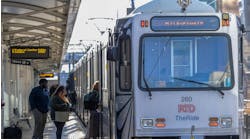At the American Public Transportation Association’s Public Transportation & Universities Conference in Grand Rapids, Michigan, university professionals, planners and transit professionals came together to share best practices and to discuss the unique demands of serving the university communities.
Technology is being utilized to help agencies be more efficient in moving students. Mobile payments and real-time information provide an easy-to-use system for students, faculty and staff and streamline service to save agencies money.
There were a lot of discussions about electric buses and two of the reoccurring themes were learn about charging so you understand infrastructure requirements and utility costs and standardization. Bus OEMs have been working together to develop standards so there can be interoperability between the various vehicles and charging infrastructure.
There were also conversations about benefits to fuel cell technology, as auto manufacturers, such as Honda, Toyota and Hyundai, are making the technology more mainstream.
While the typical electric bus range is about 120 miles, a fuel cell bus is more than twice that. David Warren, director of sustainable transportation, New Flyer of America Inc., said the hydrogen fuel cell electric buses have the benefits of a battery-electric bus, but offers the advantage of the extra range you can store in the hydrogen tanks. As he explained, “The bus thinks it’s an electric bus."






